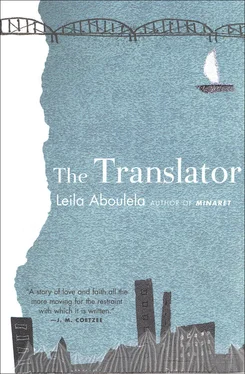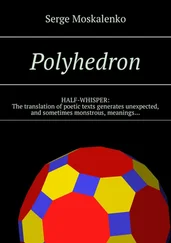She was weak today. Because of last night’s dream and she had annoyed her aunt. She couldn’t remember clearly what she had done to annoy her aunt, to trigger all that came out of her. The cracks on the ceiling. The fan? The children? The children running around like devils, making a terrible noise, then after Hanan came and went, her aunt said things… Her aunt blamed her for Tarig’s death. That was bizarre. She wished that Hanan had been present or Waleed then she would have felt sane and safe, maybe not so frightened. They would have defended her. Even if they were silent out of respect for her aunt, she would have felt that they were on her side. Rae was on her side. He had told her that in the hospital when she showed him her aunt’s letter, the address on the envelope, Aberdeen, England. He said, you’ve won me to your side in any quarrel you have with your aunt. That was what he had said. She could remember it now. She could remember. The hospital and how the glass door of the entrance was difficult to push. The way he looked when he saw her. She could remember now. Smile, gaze up at the lady in the hooped skirt and the branches of the cedar tree.
It was a joke. You’ve won me to your side, Sammar, in any quarrel you have with your aunt. It was a joke about the address and she had laughed. Someone in the post office had crossed out England with red ink. She had shown him the envelope and he had held it in his hand. There was a plaster at the back of his hand from the intravenous amoxilyn. He had thought she looked nice. She was wearing her new coat, henna-coloured and toggles instead of buttons. It was warm in the ward, too warm, and she had wanted to take the coat off but she had felt too shy. When he told her he loved her it was strange because no one had told her these words in English before. And it was not like in a film, it was just like the way he spoke, normal. If now she could have anything she wanted, she would want to look at photographs of him when he was young, black and white photographs and early coloured ones. His hair and the clothes he wore. She would like to look at his photographs and ask him questions. He would be more interested in her than in the photographs, answering her questions reluctantly, not so keen as she was to talk about the past. It was because of the way he looked at her that things came to a head, the awkwardness she felt, uneasy with everything. If they were not a man and a woman, if they were pure friends, if all that was between them was clear air, she would have been patient when she asked him if he believed and he replied, ‘I am not sure.’
There were people who drew others to Islam. People with deep faith, the type who slept little at night, had an energy in them. They did it for no personal gain, no worldly reason. They did it for Allah’s sake. She had heard stories of people changing: prisoners in Brixton, a German diplomat, an American with ancestors from Greece. Someone influencing someone, with no ego involved. And she, when she spoke to Rae, wanting this and that, full of it; wanting to drive with him to Stirling, to cook for him, to be settled, to be someone’s wife.
She had never, not once, prayed that he would become a Muslim for his own sake, for his own good. It had always been for herself, her need to get married again, not be alone. If she could rise above that, if she would clean her intentions. He had been kind to her and she had given him nothing in return. She would do it now from far away without him ever knowing. It would be her secret. If it took ten months or ten years or twenty or more.
This is my first Ramadan since I came back,’ she said, in answer to Waleed’s question.
‘Yes, you weren’t with us last year,’ said Mahasen as she reached for another piece of bread. Sammar had cut the loaves into small portions. Such thin loaves these days, shrinking while their price threatened to go up.
The three of them were eating in the garden. No electric lights competed with the moon, no garden lights. The candle Sammar had brought from inside was unnecessary and she blew it out.
It was the middle of the month of Ramadan and the moon was full. From tomorrow it would shrink and lose itself. When the new crescent appeared it would be the end of Ramadan. The end of fasting, visitors saying Eid Mubarak and new clothes for the children.
It was unusual to be alone with Waleed and Mahasen, without anyone else, without the children. Hanan and her family were with their in-laws and they had taken Amir with them. It was supposed to be only Sammar and Mahasen breaking the fast together but at the first words of the sunset azan, before they had time to eat any dates, the door bell rang. When Sammar dragged open the garden gate, it was Waleed. She had been so pleased to see him and surprised, that she hugged him and he said, ‘What’s the matter with you?’
‘What’s the matter with you coming alone without your wife?’
‘She’s eating with her parents,’ he said and nothing more. Sammar didn’t ask him why he had not gone too, it became busy with the three of them breaking their fast, dates and kerkedeh, her aunt saying to Waleed, ‘If we knew you were coming we would have made grapefruit juice.’
After Sammar put the jug of kerkedeh back in the fridge and threw away the date stones, they prayed. They prayed together with Waleed leading and Sammar and Mahasen standing close, their arms and clothes touching. Mahasen’s movements were slow when she bent down, knelt down and put her forehead on the mat. Sammar felt Waleed deliberately pausing, slowing his pace so that Mahasen could keep up. When they finished praying there was a power cut. The sudden silence of the air cooler, the sudden loss of the lights, the fan slowing down. In the stillness and faint glow of sunset, Sammar counted on her fingers twenty-seven times, There is no god but Allah and I seek forgiveness from Allah for my wrongs and for believing men and believing women…
Her aunt’s voice was loud in the room, ‘Allah curse them and their day, is this a time for this?’ ‘Them’ was the electricity company and the government, the two inseparable to Mahasen. She went on, ‘They’ve made us hate life…’ The room without the air cooler was gradually getting warm but they could still see each other without the lights.
Waleed stood up and folded his prayer mat. ‘Aunt, the supplication of the one who is fasting is granted,’ he smiled. ‘The electricity company must be in a bad way by now.’
‘The whole neighborhood is cursing them,’ said Mahasen standing up.
Sammar took the mat from Waleed and picked up hers and her aunt’s off the floor. It seemed to her funny if the whole neighborhood was really cursing the company, all that energy rising up in the sunset air. Some people were so serious about power cuts. Like her aunt, getting angry to the core.
‘Let’s eat outside in the garden, Aunt,’ she said and Mahasen sighed and nodded in agreement. Since that bad day when Mahasen had said, ‘You killed my son,’ the relationship between them had strangely improved, mellowed. It was as if Mahasen had said the worst she could possibly say and there were no more accusations after that.
In the kitchen, by candlelight, Sammar heated the food, her shadow swinging huge against the walls. The kitchen was hot and airless without the fan and she could hear the cockroaches stir and dart across the floor. But once they were seated outside, cushions on the chairs, a tablecloth on the wobbly table and there was a breeze, the food tasted good and it felt better than indoors. Much better than a normal day eating indoors with the air cooler and all the lights.
‘Last Ramadan,’ said Mahasen, scooping up stew with her piece of bread, ‘not once did the electricity cut. Things are supposed to get better and they just get worse.’
Читать дальше












